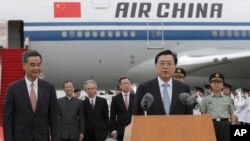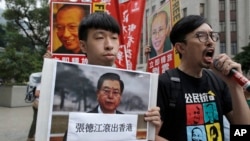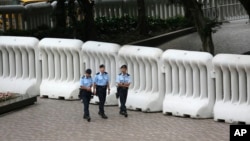With snipers perched atop buildings and thousands of police deployed to maintain security, Zhang Dejiang, the highest-ranking Chinese official to visit Hong Kong since pro-democracy protests in 2014, arrived Tuesday for a three-day visit to the port city.
Zhang said he was in Hong Kong to listen, see and speak, but even before his trip began, it was off to a rocky start. Two protests banners were unfurled and a handful of protesters arrested, despite efforts to stifle any expressions of dissent.
Hong Kong authorities have said the extensive “counterterrorism security measures” the city has put in place are necessary to ensure Zhang’s safety and no stone has been left unturned in that effort. Literally. Local media have reported that sidewalk bricks have been glued securely so they could not be lobbed by protesters.
Police were also deployed atop Lion Rock, a peak that overlooks Hong Kong, in an apparent effort to keep activists from hanging banners there. During the 2014 pro-democracy protests, a large banner reading, “I want real direct elections” hung from the rock.
Activists managed to hang a banner nearby, on Beacon Hill, early Tuesday with the same message. Another was hung from the North Lantau Highway with the message, “End One Party Rule.” The banner was removed before Zhang passed by on his way from the airport.
Both banners were hung by the pro-democracy League of Social Democrats.
Protest leaders undeterred
Avery Ng Man-yuen, the chairman of the league, live-streamed his arrest on Facebook. While he was being taken away on suspicion of violating traffic laws, he said, “Zhang Dejiang should stop being a coward and should go back to Beijing.”
Other photos on social media showed Nathan Law, a former student leader of the Occupy Central movement and chairman of the newly formed political party, Demosisto, being taken down by police.
Law said protest zones that have been set up by police have made it impossible for demonstrators to even see Zhang, and violate Hong Kong’s rights to have political demands heard and free expression. Law vowed to try to make his voice heard outside designated protest areas.
It is not clear how large the protests will be during Zhang’s visit, and some analysts noted they will largely be symbolic as some activists are running for office in legislative elections in September.
Several protests are planned during Zhang’s visits, but the designated areas are blocks away from his hotel and a conference center where he will speak at a forum on China’s “one belt, one road” policy. Tall barricades also line the roads.
Upon his arrival in Hong Kong, Zhang was greeted by its increasingly unpopular chief executive CY Leung and other senior officials. China clearly wants the visit to be a success, but which voices he will listen to, and what he will see and hear are already in question.
"[I will listen to] suggestions and demands of all sectors of society on executing the principle of one country, two systems, self-governance, on allowing Hong Kong a high degree of autonomy, how to implement the Basic Law, and how the country and Hong Kong should develop," Zhang said.
Zhang is the chairman the Standing Committee of China’s rubber-stamp National People’s Congress, a rough equivalent of parliamentary speaker, and third-ranking member of the Politburo Standing Committee of China's Communist Party.
A former British colony, Hong Kong was returned to China in 1997 and the “one country, two systems” policy was set up to ensure that it continue to enjoy its free-wheeling capitalist economy, Western-style courts, and guarantees of freedom of speech and the press.
Given China’s increasingly heavy-handed approach to the port city, however, there are growing concerns that those freedoms are at risk.
Future for democracy?
Beijing’s rejection of calls for the direct election of Hong Kong’s chief executive - a policy decision in which Zhang played a key role - triggered the 2014 Occupy protests. More recently, the apparent abduction of booksellers in Hong Kong and elsewhere in Asia who published books critical of China’s leadership has also had a chilling impact.
Additionally, the recent establishment of a pro-independence party in Hong Kong is helping make a once taboo topic more mainstream. Beijing has criticized the establishment of the party of what it calls an “extremely small group,” and some politicians in Hong Kong have echoed China’s concerns, warning such ideas threaten the city’s political and economic future.
While in Hong Kong, Zhang is scheduled to speak at a conference Wednesday on China’s “one belt, one road” policy. It is a policy that China’s leader, Xi Jinping, hopes will help further expand trade routes from China’s western border through Central Asia to the Middle East and Europe, and by sea in what it calls a maritime belt through the South China Sea and on to Africa.
Zhang will also meet with lawmakers, including some from the pro-democracy camp and dine with Hong Kong’s chief executive.






